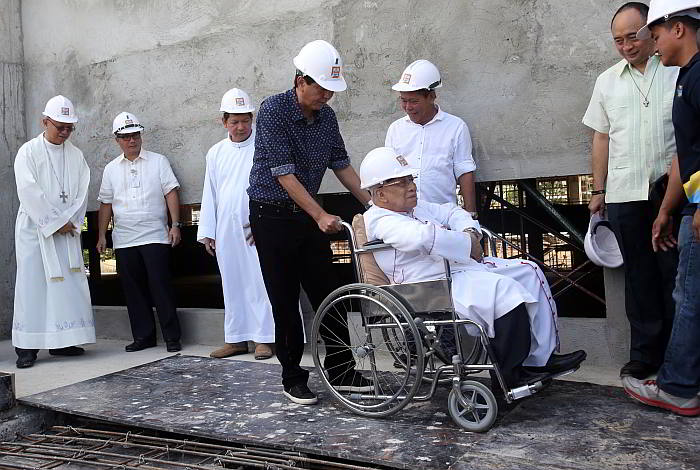
Cebu City Mayor Michael Rama guides the wheelchair of Archbishop Emeritus Ricardo Cardinal Vidal during the topping-off ceremony of the Eucharistic Pavilion in Mabolo, Cebu City. (CDN Photo/Junjie Mendoza)
Don’t look now – Cebu did a miracle,” said Cebu Archbishop Jose Palma.
Building a pavilion to house 15,000 delegates for the 2016 International Eucharistic Congress has been an uphill climb.
Palma, speaking at the topping-off ceremony on July 15, called the project “an act of faith and a labor of love.”
The Eucharistic Pavilion which is 80-percent complete will serve as the main venue for delegates from around the world attending the 51st IEC in Cebu City on January 24 to 31, 2016.
When Pope Emeritus Benedict XVI first announced that Cebu City would be the venue, Palma said he was anxious because the city has no venue that can seat all 15,000 delegates.
Palma said the archdiocese first thought of using different hotels in the city, and letting delegates witness the events unfolding through wide video screens.
In the end, they decided to build the venue amid questions of cost and time pressure.
“And so we agreed to construct a pavilion. The next problem was who would construct it? And how will we finish it on time?” said Palma after a thanksgiving
Mass attended by construction workers at the site.
The plenary hall of the International Eucharistic Congress (IEC) Pavilion will have three levels and parking for 200 cars.
(CDN Photo/Junjie Mendoza)
“Amid several concerns, we decided to do it as an act of faith,” Palma recalled.
Things fell into place when Duros Development Corp. (DDC), whose owners are officers of the Catholic Charismatic Communities of Cebu, agreed to build the pavilion and advance the P550 million cost. The location in the archdiocesan seminar in barangay Mabolo ensured land was owned by the church.
The Plenary Hall is 69-percent finished while a separate Secretariat Building is 95-percent done. Parking for 200 cars is provided.
The project will be turned over to the archdiocese by October.
DDC pledged to donate the pavilion to the church and in exchange, the Archdiocese will give DDC usufruct rights over part of the seminary property for 25 years.
After the IEC is over, the pavilion will be used as a pastoral center and a new minor seminary for the archdiocese.
It can also serve as the “biggest evacuation center” in Cebu island” said Palma.
First time
At 84, Archbishop Emeritus of Cebu Ricardo Cardinal Vidal sat in a wheelchair, happy to witness the milestone.
“I have been to several IECs around the world. But this is the first time the IEC will be housed in one building alone,” he said.
He joined the traditional final pouring of concrete at the project site, with Cebu City Mayor Micahel Rama pushing the handlebars of his wheelchair.
Vidal is expected to preside over the Mass and administer First Holy Communion to several children during the week of the IEC.
The last IEC was held in Manila in 1937, when Vidal was a 6-year-old boy lining up to take his first holy communion.
“I don’t know if any of you here were born when the Philippines first hosted the IEC,” Vidal said.
“That was my first time to see a cardinal. He was wearing red. And I was thinking, “Bakit ba may reyna dyan (Why is there a queen up there in the altar)?” the cardinal quipped.
Cebu Auxiliary Bishop Dennis Villarojo, IEC secretary-general, described the pavilion as a “house of God built on faith.”
Leap of faith
“If the Lord does not build the house, in vain we labor. In the same manner, if the Lord wants to build the house, in vain do its detractors labor,” Villarojo said.
Spouses Fe and Rafaelito Barino of DDC said building the Pavilion was a “leap of faith.”
Fe said she was daunted by the task after being called up by Archbishop Palma.
“But I listened to the Lord with conviction. There were concerns, but if we really trust in God, everything will fall into place,” Fe said. Her husband shared the same thought.
“We had many obstacles, but someone up there is giving us the strength and the stamina,” Rafaelito said.
Cebu City Mayor Rama noted that Cebu became a city in 1937, the same year as the first IEC held in the Philippines.
“The father of the Cebu City Charter is Don Vicente Rama. And now that the IEC will be held in Cebu City, the second in the Philippines, a mayor with the family name of Rama is here,” he said.